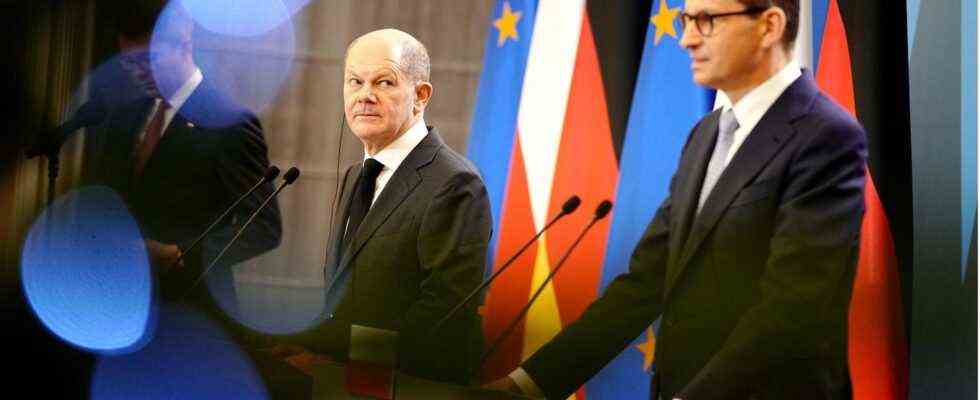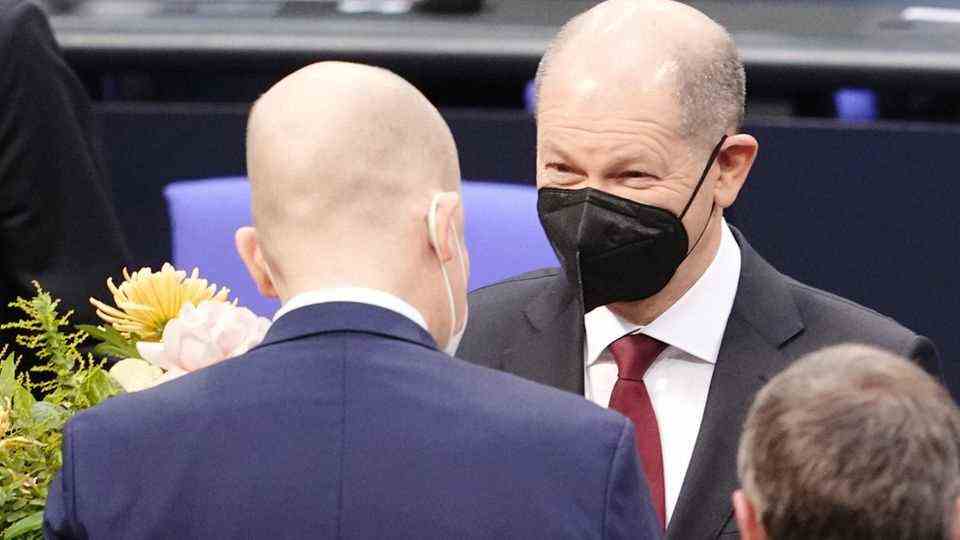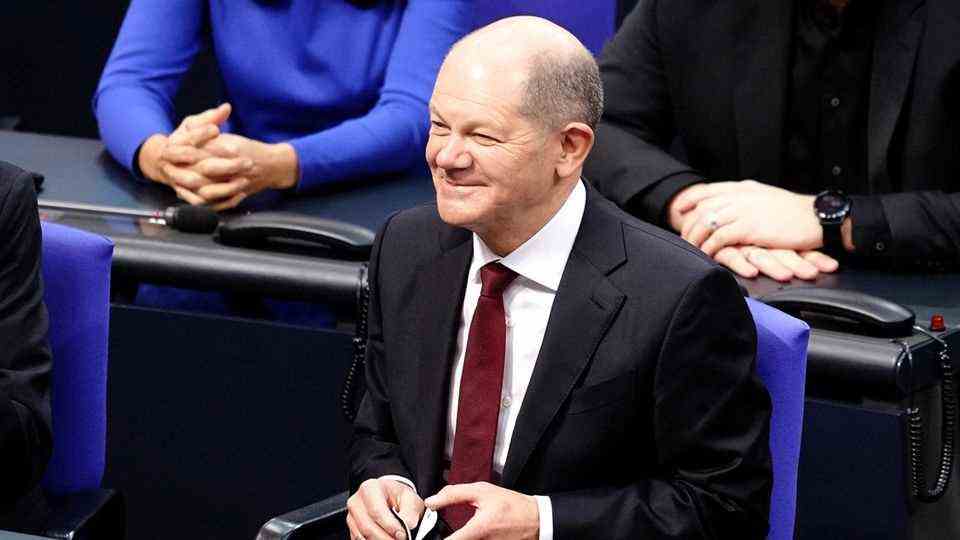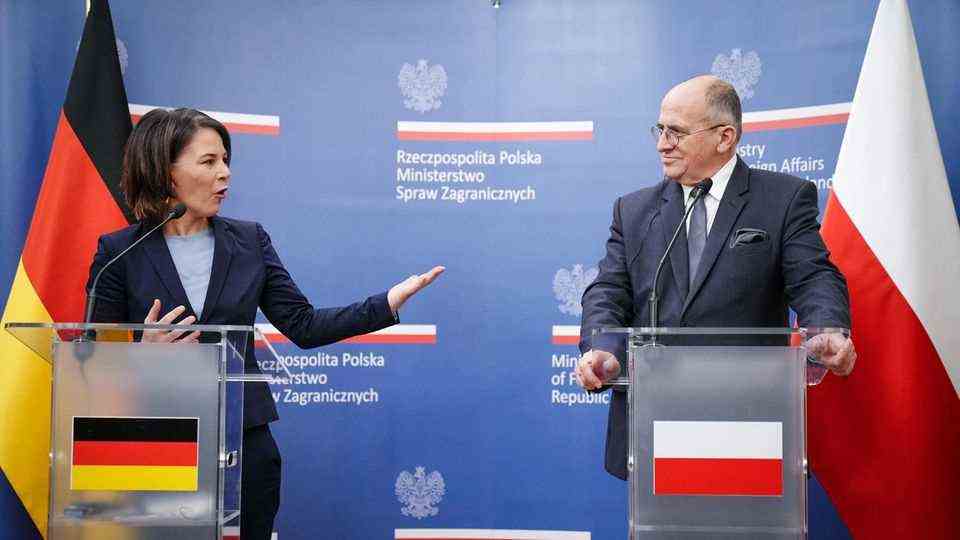Baptism of fire for the new Chancellor
In Poland, Scholz is being tested for his ability to take
Poland, Warsaw: Federal Chancellor Olaf Scholz (left, SPD) and Mateusz Jakub Morawiecki, Prime Minister of Poland, give a press conference after a joint conversation
© Kay Nietfeld / DPA
The inaugural visits to Paris and Brussels were still straightforward for Chancellor Scholz. Warsaw is its first real foreign policy test. He has to take multiple criticism there – and has a new tone when it comes to an extremely sensitive topic.
During his inaugural visit to Warsaw, Federal Chancellor Olaf Scholz (SPD) rejected Polish demands for World War II reparations, including with reference to German payments to the EU. On Sunday after a meeting with Prime Minister Mateusz Morawiecki, he underlined the position of the previous governments that the question of compensation for the damage caused by Nazi Germany in World War II was legally closed. But Germany will “continue to be ready and willing (…) to make very, very high contributions to the financing of the budget of the European Union,” he said. Scholz is the first Chancellor to link the two issues in this way.
The third inaugural visit of the new Chancellor after less conflict-prone visits to Paris and Brussels was the first real foreign policy test for him. The SPD politician had announced the trip as a “friendship visit”. However, a number of conflict issues came up – especially from the Polish side:
EU traffic light plans: “Synchronization and egalitarianism”
Morawiecki described the plans for a stronger federalization of the EU, which were laid down in the coalition agreement between the SPD, the Greens and the FDP, as “conformity and equalization”. In Poland this is understood as “democratic centralism, bureaucratic centralism”. Europe will be strong as “Europe of the home countries”.
The coalition agreement of the SPD, Greens and SPD speaks of the goal of an EU as a federal European state. Leading representatives of the right-wing conservative ruling party PiS had insinuated in the past few days that the new federal government was planning to build a “Fourth Reich”.
Nord Stream 2: “Political and energetic noose” around Ukraine
The Polish Prime Minister also called for the controversial Baltic Sea pipeline Nord Stream 2 to be prevented from operating. The project will increase Russia’s ability to put pressure on the EU and tighten the “political and energetic noose” around Ukraine, he said. Scholz confirmed that Germany would continue to be responsible for Ukraine’s gas transit business in the future. Ukraine will also be supported in the expansion of renewable energies. Scholz did not respond to Morawiecki’s request to prevent the pipeline from going into operation.
The Baltic Sea pipeline from Russia to Germany was completed weeks ago. The Federal Network Agency has until the beginning of January to decide on an operating permit for the pipes, through which up to 55 billion cubic meters of natural gas will be delivered from Russia to Germany annually.
Reparations: “Sea of Tears”
Poland’s national-conservative PiS government repeatedly addresses the reparation claims against Germany. Only recently, Morawiecki announced the establishment of an institute to research all war damage. For the federal government, the issue is legally and politically closed. It mainly refers to the Two-Plus-Four Treaty on the Foreign Policy Consequences of German Unity of 1990.
In the press conference with Scholz, Morawiecki did not expressly reiterate the reparation claims. But he said he had spoken to Scholz about the subject. “It’s not just about a sea of tears from our mothers, a sea of our fathers’ blood, but also about lost opportunities for normal development, lost freedom, lost democracy and lost independence.”
Rule of law: Scholz hopes for a “pragmatic solution”
On the subject of the rule of law, Scholz emphasized that he was relying on an agreement between the EU Commission and Poland. “Europe is a community of values and rights. We are united by the idea of the rule of law and democracy,” he said. That’s why he hopes for a “very good pragmatic solution”. Poland’s PiS government has been restructuring the judiciary for years and is in dispute with the EU Commission. Critics accuse Warsaw of putting judges under pressure and making the judiciary compliant. Because of the controversial reforms, the EU Commission has opened several infringement proceedings against Warsaw and filed suits with the European Court of Justice.
Refugees in Belarus: Scholz pledges support
But there are also issues on which the two countries show greater agreement. The new chancellor assured Poland of support in the dispute over how to deal with refugees, who for weeks have been trying by the thousands to get from Belarus across the EU’s external borders to Poland or the Baltic states. The actions of the Belarusian ruler Alexander Lukashenko are “inhuman, and we have a common task to reject it,” said Scholz. Germany wants to act in solidarity with Poland against this inappropriate way of a “hybrid warfare”. “It is really terrible what the Prime Minister of Belarus, Lukashenko, is doing there. He uses people for his political purposes.” The EU accuses Lukashenko of specifically having people flown into Belarus from crisis regions in order to then smuggle them into the EU and thus destabilize the situation there.




